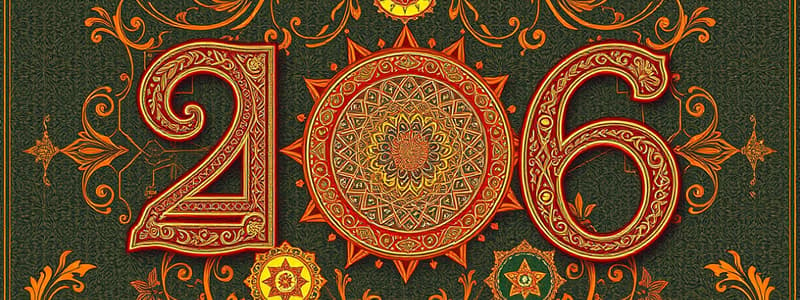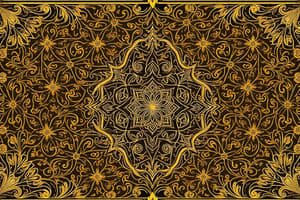Podcast
Questions and Answers
What defines the set of whole numbers?
What defines the set of whole numbers?
- Fractions and decimals
- Negative integers only
- Only positive integers
- Non-negative integers including zero (correct)
Which property confirms that adding two whole numbers results in another whole number?
Which property confirms that adding two whole numbers results in another whole number?
- Associative property of multiplication
- Closure under addition (correct)
- Commutative property of subtraction
- Distributive property
What is the additive identity element of whole numbers?
What is the additive identity element of whole numbers?
- 1
- 0 (correct)
- -1
- None of the above
Which statement is true about the set of integers?
Which statement is true about the set of integers?
What is the result of adding an integer and its additive inverse?
What is the result of adding an integer and its additive inverse?
What is the role of the number 1 in the context of integers?
What is the role of the number 1 in the context of integers?
Which property is satisfied by integers regarding multiplication over addition?
Which property is satisfied by integers regarding multiplication over addition?
Which of the following examples is NOT a whole number?
Which of the following examples is NOT a whole number?
Why are whole numbers and integers considered closed under addition?
Why are whole numbers and integers considered closed under addition?
What does the set of integers include?
What does the set of integers include?
Flashcards are hidden until you start studying
Study Notes
Whole Numbers
- Whole numbers are non-negative integers, including zero.
- Represented by the letter "W" and defined as: W = {0, 1, 2, 3, 4, 5, …}
- Example values include 0, 49, 67, 52.
Natural Numbers
- Also known as "counting numbers," starting from 1 to infinity.
- Represented by the letter "N" and defined as: N = {1, 2, 3, 4, 5, …}
- Example values include 35, 59, 110.
Integers
- Comprise both whole numbers and negative natural numbers.
- Represented by the symbol "Z" and defined as: Z = {… -3, -2, -1, 0, 1, 2, 3 …}
- Example values include -52, 0, -1, 16, 82.
Rational Numbers
- Defined as numbers that can be expressed as a fraction p/q, where p and q are integers and q ≠ 0.
- Represented by the letter "Q."
- Example fractions include 7/1, 10/2, 1/1, and 0/1.
Properties of Rational Numbers
- Closed under addition, subtraction, multiplication, and division.
- Satisfy commutative and associative properties for addition and multiplication.
- Follow the distributive property for addition and subtraction.
Properties of Whole Numbers
- Closed under addition and multiplication.
- Zero serves as the additive identity; one is the multiplicative identity.
- Complies with commutative and associative properties for addition and multiplication.
- Adheres to the distributive property of multiplication over addition and vice versa.
Properties of Integers
- Closed under addition, subtraction, and multiplication.
- Zero acts as the additive identity; one is the multiplicative identity.
- Follows commutative and associative properties across addition, subtraction, and multiplication.
- Satisfies the distributive property relative to addition and subtraction.
- Each integer 'a' has an additive inverse '-a' so that a + (-a) = 0.
Studying That Suits You
Use AI to generate personalized quizzes and flashcards to suit your learning preferences.




